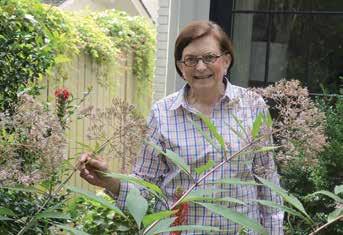
3 minute read
Around Town
Joe Earle is Atlanta Senior Life editor-at-large and has lived in metro Atlanta for over 30 years. He can be reached at joeearle@ reporternewspapers.net
When Esther Stokes moved into a new home in Brookwood Hills a couple of years ago, the yard sprouted many familiar flowering plants with roots in foreign places. Now those imports are disappearing. Stokes is replacing her azaleas and camellias with Joe Pye weed, cardinal flowers and other types of greenery that grew up here in the wild.
With her new plantings, Stokes, a landscape designer by trade, is going native. Why? Because her garden is for the birds.

It’s a bit for the bees, too. Also, the bugs, to tell the truth. But it’s mostly for the birds Stokes has been paying close attention to since she was a child growing up in Virginia and that she supports as chair of the board of Georgia Audubon, a bird-centered nonprofit that claims it builds places “where birds and people thrive.”
“Literally, that is what we try to do,” Stokes said one warm August morning as she sat on the shaded patio in her native-plant-filled garden. “Whether we are restoring or establishing new habitat or whether we are maintaining what is there, everything is through the lens of birds. And if birds are thriving, those are good places for people.”
These days, Stokes said, Georgia Audubon wants to do more to support birds. The 1,700-member organization, based at the Blue Heron Nature Center in Buckhead, is spreading its efforts across the state, is adding staff, and has changed its name to reflect its new aims. Until August, the organization was known as the Atlanta Audubon Society, or, before that, the Atlanta Bird Club.
Stokes says Georgia Audubon intends to work with the other, smaller Audubon societies around Georgia and will sponsor projects to help fill the gaps between various local clubs and state Audubon societies in neighboring states.
“I feel like Atlanta Audubon, and now Georgia Audubon, has become a part of the conservation community,” she said. “We have been very intentional about that, and because we think partnerships are critical — you can’t do everything yourself — we’ve begun a lot of that sort of work. And there’s lots left to do.” Interest in birds came naturally to Stokes. “I’ve been interested in parks and birds as long as I can remember,” she said.
There was a time, back when she was in her 20s, that she enjoyed simply keeping an eye on birds and kept lists of the different kinds of birds she’d seen.
Nowadays, with the coronavirus keeping everyone at home, more people are discovering the pleasures of birdwatching, she said, and Georgia Audubon is providing online classes and virtual bird walks on Facebook to help both longtime bird fans and newcomers expand their participation in the hobby. “We have found people are staying at home and watching their feeders and it has opened a window and their minds,” Stokes said. “People have noticed that not all birds look alike.”
But Stokes’ chief interest these days is watching the bigger picture, the overall habitat that supports the birds. Her new interest came as a natural outgrowth of her work as a landscape designer, which she started in the 1980s, and continued as her volunteer work with Piedmont Park led to work with other Atlanta parks and eventually back to birds through Audubon.
Native habitats are important she said, because birds and bees and bugs do best when they live among the sorts of plants their kind long have lived among.
“For the last 50 years, in the landscape area, we have imported all these plants from China and Japan that do well here, but the insects don’t recognize them,” she said. “They are beautiful, but they don’t provide ecosystem services.”
And some birds depend on those bugs as a source of food. So, what’s good for the bugs can be good for the birds, too.
Stokes says the people at Georgia Audubon intend to foster native habitat across the state. One of the organization’s new employees will be based at and work on projects on the Georgia coast.
“Research has shown us that ‘if you build it, they will come,’” she said, as birds occasionally darted through the shrubs and trees in her yard in search of late-morning snacks. “We’re losing things like grassland birds because they don’t have habitat, but if you build a grassland, they will come back.”
Georgia birds now can find a number of recently restored habitats, with more added every year. In Brookwood Hills, for instance, they can just check out Esther Stokes’ backyard.








